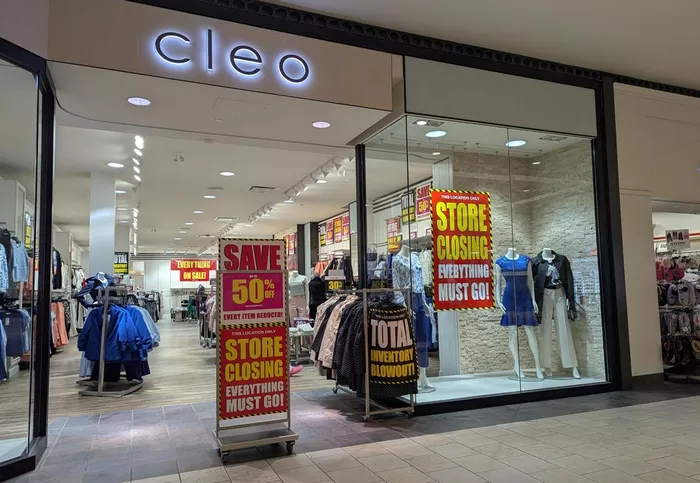Ricki’s and Cleo, two well-known Canadian apparel brands, are set for a second chance after being purchased by Ancaster-based Putman Investments Inc., a company known for reviving struggling retailers.
Court documents confirm that Comark Holdings Inc., the specialty fashion retailer behind Ricki’s, Cleo, and Bootlegger, received approval earlier this month to sell the brands to Putman Investments. This comes after Comark and its subsidiaries, including Ricki’s Fashions Inc., Cleo, and Bootlegger, filed for creditor protection under the Companies’ Creditor Arrangement Act on January 7.
Following the announcement of the bankruptcy protection filing, liquidation sales began at Ricki’s, Cleo, and Bootlegger stores, offering discounts ranging from 25 to 40 percent on merchandise. As the liquidation process continues, customers can now benefit from discounts of up to 50 percent on remaining stock.
At its peak, Comark operated roughly 300 retail locations across Canada under the Ricki’s, Cleo, and Bootlegger banners. However, the COVID-19 pandemic hit the company hard, leading to the closure of about 80 stores after it sought creditor protection.
Ricki’s, which was founded in 1939, is recognized for carrying fashion brands like Pieces, Only, and Vero Moda. Cleo, established in 1979, is known for its workwear-focused fashion and accessories for women.
Alongside the sale of Ricki’s and Cleo, Comark also announced an agreement to sell its Bootlegger brand to Warehouse One Clothing Ltd.
The $12.8 million sale of Ricki’s and Cleo includes inventory, store furnishings, trademarks, intellectual property, and select store leases. Most of the brand’s retail workers are expected to be offered new positions with Putman, according to The Canadian Press.
Doug Putman, owner of Putman Investments, has earned a reputation for successfully revitalizing struggling Canadian retail brands, including Toys “R” Us, HMV, Sunrise Records, and Northern Reflections. In recent years, Putman has made moves to fill the void left by Bed Bath & Beyond with the launch of a new home decor store, rooms + spaces, some of whose merchandise has even appeared in Toys “R” Us locations.
Marvin Ryder, an associate professor of marketing at McMaster University’s DeGroote School of Business, explains that businesses in distress may simply vanish from the market, but an entrepreneur may find value where others see failure and decide to resurrect the brand.
“This usually depends on the cause of death,” Ryder said. “If the issue was strong consumer demand but poor management or financial issues, the brand can be revived. However, if consumers had lost interest, it’s harder to breathe new life into the company.”
Ryder points to Putman’s past successes, particularly with Toys “R” Us Canada, as evidence of his ability to revive struggling brands. However, he notes that the road ahead for Ricki’s and Cleo may be more challenging.
“Fashion can be a very fickle business,” Ryder said. “A brand can be popular one year and forgotten the next.” He also stressed that inventory turnover is crucial for retail success. If consumers aren’t willing to pay full price, constant discounting can hurt a brand’s long-term profitability.
While Ryder acknowledges Putman’s track record, he believes that reviving Ricki’s and Cleo could be more difficult than revitalizing a brand like Toys “R” Us. The fate of these apparel stores now rests in the hands of Putman Investments as they work to breathe new life into the brands.
Related Topics
- Whataburger Teams Up with Wrangler for New Clothing Line
- West Cumbrian Clothing Brand Marks 30 Years of Success
- Canadian Tire Sells Helly Hansen to Kontoor Brands for $1.28 Billion

